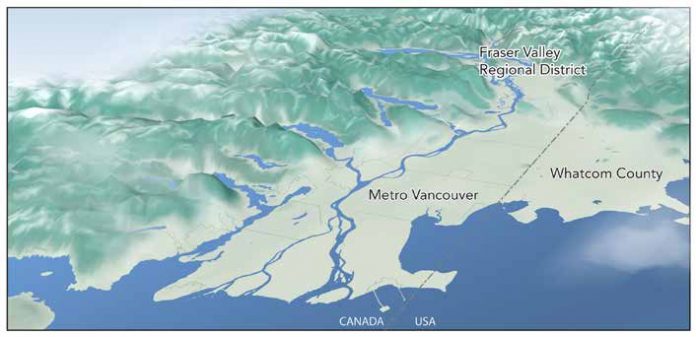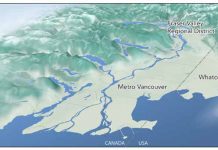METRO Vancouver announced on Saturday that it is issuing an Air Quality Advisory for Metro Vancouver and the Fraser Valley because of high concentrations of fine particulate matter that are expected to persist through the weekend. Elevated levels of fine particulate matter are due to smoke from both wildfires burning in BC and the US and a fire burning in Vancouver at a wood recycling facility.
Wildfires burning southeast of Chilliwack and Hope, including two fires near Manning Park (Heather Lake) and Hope (Flood Falls Trail), are producing smoke that is impacting the region. Today and tomorrow, additional smoke is expected to arrive from the south, further degrading air quality.
Additionally, a local fire burning in Vancouver at a wood recycling facility is also producing considerable smoke which is trapped near the surface by an inversion. Smoke from the fire is impacting multiple municipalities including Vancouver, Burnaby, Richmond, New Westminster, Surrey, and Coquitlam.
Smoke concentrations may vary widely across the region as winds and temperatures change, and as wildfire behaviour changes.
Fine particulate matter, also known as PM2.5, refers to airborne solid or liquid droplets with a diameter of 2.5 micrometres or less. PM2.5 can easily penetrate indoors because of its small size.
Postpone or reduce outdoor physical activity while PM2.5 concentrations are high, especially if breathing feels uncomfortable. Exposure to PM2.5 is particularly a concern for people with underlying conditions such as lung disease, heart disease, chronic obstructive pulmonary disease (COPD), asthma and/or diabetes; individuals with respiratory infections; pregnant women and infants; children; older adults; and outdoor workers (e.g. construction and agricultural workers). Individuals who are socially marginalized may also be at elevated risk (e.g. people who are experiencing homelessness or are underhoused).
Indoor spaces with HEPA air filtration and air conditioning can offer relief from both air pollution and heat. Consider setting up a clean air space in your home by running a portable HEPA air cleaner in one or more rooms or visiting a public building with air conditioning (e.g., community centre, library, mall, etc.). As we are in the summer season with warm temperatures, it is also important to stay cool and hydrated. If it is hot, also consider using a portable air conditioner to keep your indoor space comfortable (if you do not have central air conditioning).
If you are experiencing symptoms such as chest discomfort, shortness of breath, coughing or wheezing, seek prompt medical attention. Call 911 in the case of an emergency.
Fact sheets on the health effects of wildfire smoke and information on how to reduce exposures, such as using air filtration, can be found at www.bccdc.ca/health-info/
Metro Vancouver works in cooperation with Environment and Climate Change Canada, Fraser Valley Regional District and BC Ministry of Environment and Climate Change Strategy to look after air quality.
Information about real-time air quality readings for Metro Vancouver and Fraser Valley communities and potential health impacts can be found at www.airmap.ca and www.env.gov.bc.ca/epd/
To sign up for air quality alerts in your area, go to www.metrovancouver.org/












